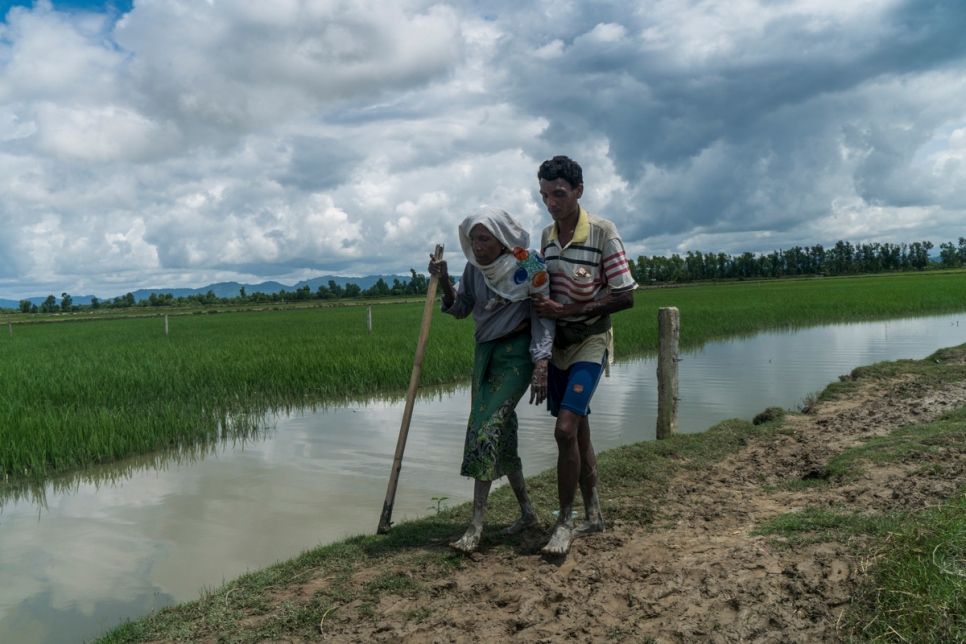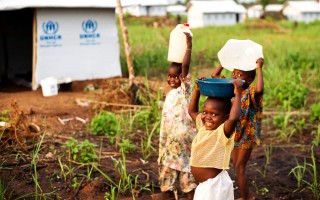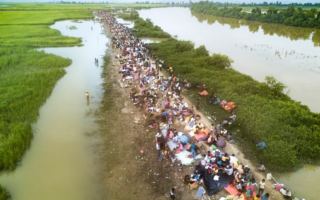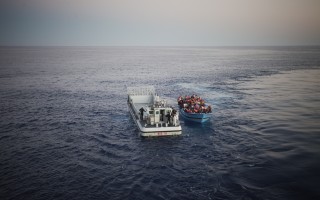
A 70-year-old Rohingya refugee is helped by her son after crossing into Bangladesh from Myanmar on foot in September 2017. © UNHCR/Adam Dean
UNHCR’s 2 Billion Kilometres to safety campaign calls on runners, walkers and cyclists to dedicate their kilometres in solidarity with families uprooted by war and persecution.
By UNHCR Staff
GENEVA – More than 20,000 Lost Boys trek hundreds of kilometres from southern Sudan to Ethiopia in a desperate search for safety after civil war broke out.
One million Kosovars set off on foot across the barbed-wire strewn border to Albania and Macedonia fleeing conflict at home.
Hundreds of thousands of Rohingya hike for days through the jungle to escape violence in Myanmar and find refuge in Bangladesh.
These are some of perilous journeys that refugees have made on foot that United Nations Deputy High Commissioner for Refugees Kelly T. Clements has in mind when she pulls on her running shoes and sets out on the street.
A keen recreational runner, Kelly has signed up to UNHCR’s 2 Billion Kilometres to safety campaign – the UN Refugee Agency’s new global movement to highlight the staggering distance that refugees trek in search of safety each year.
It calls on recreational runners, walkers, cyclists and those using wheelchairs from all over the world to dedicate the kilometres they cover in solidarity with families around the world uprooted by conflict and persecution.
Run. 🏃♀Walk.🚶♂ Bike.🚴♀ Wheel. ♿️
No matter how you log your miles… make them count. #StepWithRefugeeshttps://t.co/sjU5LXmMBP pic.twitter.com/P6Alw0rffB— Kelly T. Clements (@KellyTClements) January 8, 2019
“I wanted my modest miles or kilometres that I might run in a week, or a month, or a year to go to something that is much greater than myself personally,” Kelly says of the campaign.
“It makes real what unfortunately too many families face around the world.”
The initiative is truly global in reach and is open to all. You can sign up in a few simple steps, pledging the kilometres you cover through Fitbit or Strava.
It is also possible to identify a target and then add the kilometres manually, straight onto the website, up to a maximum of 30 miles per entry.
Kelly, who runs three to seven miles, four to five times a week, records her total on her iPhone, and then uploads it by hand.
“For me it’s recreational. It’s a way to clear my head, a way for me to think about what I need to be doing at work and home,” she says.
“And it also allows me to be thinking more broadly about how I can actually put my feet on the pavement and run, where others may not be able to, or they are running not because they want to, but because their lives and their families’ lives depend on it for different reasons.”
She runs at least one half marathon a year, and hopes that runners of all abilities will sign up to the campaign.
“Often in these races, these runs, the most inspiring people that pass me on the route are those in wheelchairs, because they are moving fast and they’re in great shape.
“It’s why you are doing it, and often it is for a greater good.”
Originally published by UNHCR on 18, January 2019
JOIN THE MOVEMENT AND STEP WITH REFUGEES


